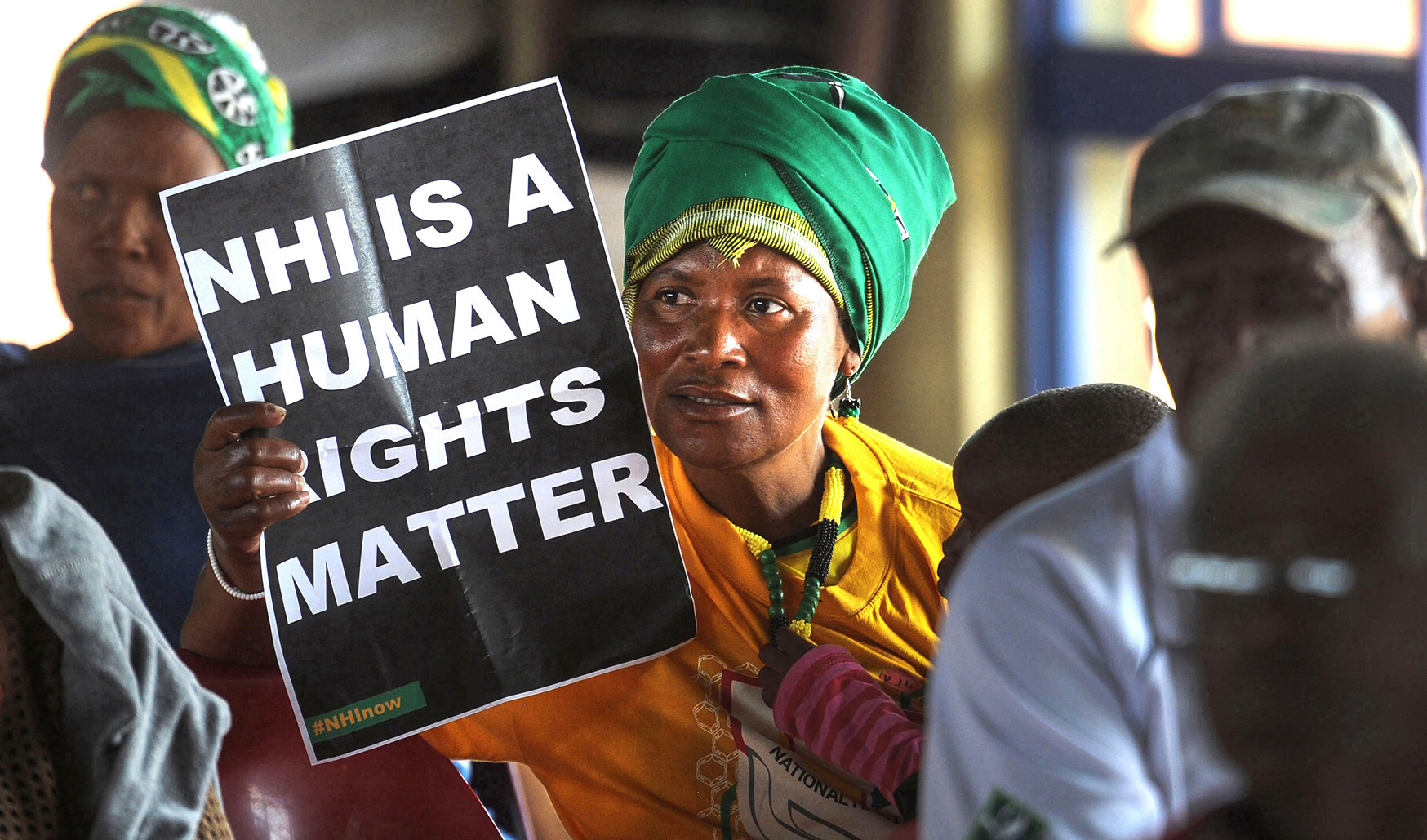HEALTHCARE DISASTER
Shortage of medical specialists is a looming crisis for Africa, experts warn

Retaining and securing medical specialists for Africa is a necessity, not a luxury, for quality integrated public healthcare, say experts who warn of coming crises.
A looming shortage of medical specialists in South Africa and across the continent stands to put Africa’s healthcare progress further on the back foot, deepen global inequities and ultimately throttle the training pipeline of professionals.
These challenges are tipping points for worst-case scenarios for public healthcare, said Eric Buch, chief executive of the Colleges of Medicine of South Africa (CMSA) and a professor in health policy and management at the University of Pretoria. They also impact on the success of meeting the aspirations of universal health coverage, including in South Africa through the National Health Insurance.
It made the focus of last week’s two-day International Medical Education Leaders Forum – Africa conference at the university about pushing for greater investment in and promotion of specialised medicine as “not a healthcare luxury” but a vital part of building integrated public healthcare systems across Africa.
There was also a clear warning from speakers at the conference that Africa must raise a stronger unified voice or specialist expertise will continue to be exported to richer countries or be reserved for the moneyed and the elites on the continent.
Another call was to simultaneously work on staff retention strategies, including addressing underlying conditions that cause job dissatisfaction, while pushing back harder on things like the World Health Organization’s (WHO) code of conduct on international recruitment. The code is meant to prevent “brain drains” but has become too easily circumvented and doesn’t carry adequate consequences for non-adherence.

The medical specialist challenges also impact on the success of meeting the aspirations of universal health coverage, including in South Africa through the National Health Insurance. (Photo: Rosetta Msimango / Spotlight)
For decades the continent has borne the brunt of the loss of medical expertise and weakening training support and infrastructure. A WHO survey released in June 2022 and published in the British Medical Journal Global Health found that even at a primary healthcare level – never mind specialist level – the continent falls short of the WHO’s threshold density of 4.45 health workers (physicians, nurses and midwives) per 1,000 people. Across 47 countries the average was a mere 1.55 health workers per 1,000 people. Only Mauritius, Namibia, Seychelles and South Africa scored above the threshold ratio.
Read in Daily Maverick: “Nelson Mandela Bay state hospitals face collapse – doctors resign on ‘unprecedented’ scale”
There’s urgency for specialists to act. Buch added: “The agenda of this gathering that represents nine Colleges of Medicine in South Africa (CMSA), West Africa and East Africa, is a first of its kind in many ways because we recognise that as specialists we are at a moment where we have the responsibility to drive an agenda about the unique and essential contribution of specialists to healthcare and the threats to our healthcare systems if we don’t make our voices heard.”
The conference drew representatives from an 11,000-member community.
The aim now, Buch said, is for a detailed conference report to be compiled with clear recommendations and actionable steps. This document will be presented to the WHO, the African Union and the global community of medical education fraternities and colleges. It was about African specialists fighting for a seat at the table to shift agendas.
Representatives at the conference also homed in on the wellness, support and leadership development of doctors. It’s an overlooked area, said Professor Suvira Ramlall, the CMSA president at the College of Psychiatrists, in her presentation. She added that there is terrible irony that doctors are often the worst patients, neglecting their own mental health needs. Other speakers who touched on this theme raised concerns about stigma and fear of seeking help because of the risk of losing licenses to practice or suffering reputational damage.
Speakers said that many doctors, as a result, start their journey to specialisation with unseen or hidden burdens of mental health issues. There are pressures to succeed in advancing their careers while often working for low pay and in appalling conditions. Not being able to help their patients in the way they are trained to do also amounted to moral injury, burnout and ultimately exiting the public healthcare system.
Other presentations highlighted the lingering impact on doctors who bore direct witness to the scale of death and severe illness from the Covid-19 pandemic. Data presented also showed a growing reality that many doctors and health workers are dependent on alcohol and drugs to cope.
Visit Daily Maverick’s home page for more news, analysis and investigations
The third key conference theme focused on improving and consolidating examination and assessment standards for specialists. It’s become crucial to improve public trust of specialists trained on the continent.
“We have been working towards workplace-based assessment and a programme of entrustable professional activities that every specialist knows their discipline, not that they’ve just filled a logbook,” said Buch of efforts in South Africa.
Read in Daily Maverick: “Moonlight sonata — the illegal cash cow draining specialist care at SA’s state hospitals”
But even as the CMSA had more than 5,000 candidates who went through the same final exit exams each year, the output of specialists still faced severe bottlenecks. “There just aren’t enough specialist training posts at academic hospitals. So, the pipeline is too small to produce the number of specialists required to meet the national needs.”

The conference heard that there ‘just aren’t enough specialist training posts at academic hospitals’. (Photo: iStock)
It’s a deepening crisis for South Africa, and already a disaster in many countries in the rest of Africa. For Dr Jane Obudu Fualal, president of the College of Surgeons of East, Central and Southern Africa, that means patients from countries like hers, Uganda, are forced to travel to South Africa or overseas for specialist treatment. Many who can’t afford it simply die. Those who spend on treatment outside their borders add to the economic bleed for their countries.
Fualal said it should be a trend that can be reversed with better strategising and investment. “We have to make governments understand that we don’t have to lose billions and instead we can make Africa a destination for specialist medical tourism.”
Lives above profit
She also called for more innovation and locally appropriate solutions. For instance, Covid-19 had revealed ways to optimise online platforms. For candidates in her region it had helped cut travel accommodation costs and time.
Professor James Jawi, the Kenyan executive director of the African Centre for Global Health, said that ultimately the conference’s message needs to reach politicians and policymakers:
“For a long time we have been led by economic thinking which states that the key thing is to control inflation so that the economy can grow and only when the economy has grown will you have enough money to provide healthcare. We’ve been arguing against this – economists and politicians need to start thinking about values differently, other than GDP and profit and that what matters are the lives of people.”
Read in Daily Maverick: “Helen Joseph doctors speak out – ‘we won’t give up without a fight’”
Jawi added that coming healthcare threats will look like a repeat of the Covid devastation of 2020. It should compel governments to be better prepared and to invest in health and education.
“Even the few people we are training as specialists, we are losing to other countries because at home we are not giving them sufficient incentives to stay. Government needs to understand that specialist medicine is not ‘too expensive’ and healthcare is not a consumptive sector – it is a productive sector.” DM/MC




















Due to the DoH’s financial constraints, the number of specialists posts available were halved.
This was certainly not due to a lack of interest from prospective doctors actually wanting to specialise but due to corruption and misallocation of funds. In 2023 there is a situation where over 40 doctors are applying for a single available registrar post to specialise.
Some doctors especially white males are waiting up to 10years just to start a 5 year specialist training. This means they only qualify when there are nearly 40 years old. Surely that suggests a problem with the system.
Perhaps a possible solution would be for private hospitals to offer specialising posts at a reduced rate as to allow patients to choose their level of expertise and cost. This would allow more specialists to be produced under the training of private specialists and help alleviate the burdening of specialising in public institutions.